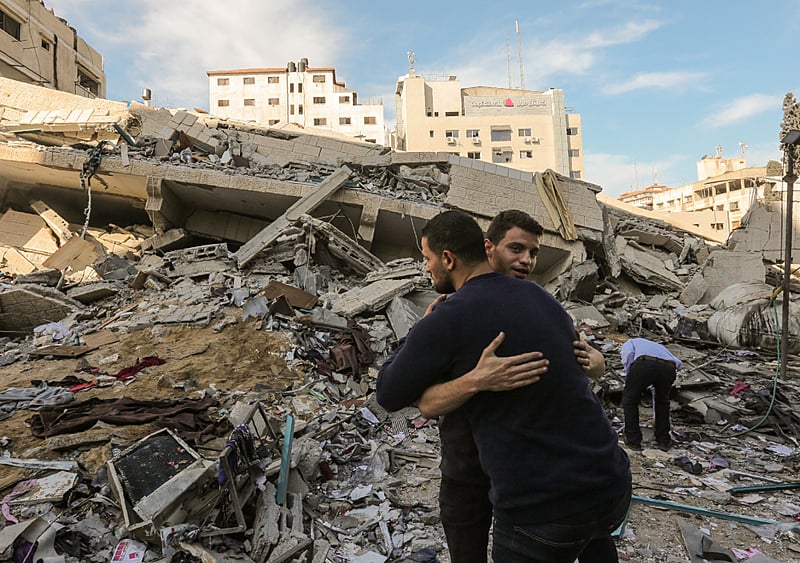Negotiation deadlocks create tensions, but the government signals significant progress.
The Israeli government announced that its cabinet will convene on Friday morning (17th) to vote on a ceasefire agreement, which also includes the release of hostages held in the Gaza Strip by Hamas. This information was confirmed by an Israeli official, who highlighted that the vote was postponed to allow the resolution of last-minute obstacles that arose during negotiations held in Doha, Qatar.
Initially, the cabinet meeting was scheduled for Thursday (16th) but was delayed after Prime Minister Benjamin Netanyahu’s office announced that critical issues needed adjustment before the meeting. The announcement of the new date indicates that these obstacles have been addressed, enabling the process to move forward. The cabinet meeting, composed of ministers and key Israeli leaders, will be crucial in deciding the next steps amid one of the region’s most intense and prolonged conflicts.

Following the meeting’s postponement, Hamas publicly reaffirmed its commitment to the ceasefire agreement mediated by international powers. Izzat el-Reshiq, one of the group’s representatives, stated that “Hamas is committed to what was agreed upon and to the ceasefire announced by the mediators.” He also expressed concern over statements from the Israeli government, which he claimed could be used to backtrack on the commitment. “I hope such declarations from Netanyahu’s cabinet are not an attempt to evade their commitment to the ceasefire agreement,” he added.
The ceasefire negotiations are mediated by various international actors, including Qatar, Egypt, and UN representatives, who have pressured both sides to reach a truce that could alleviate the humanitarian crisis in the Gaza Strip and ensure the release of Israeli hostages.
The current crisis in Gaza stems from an escalation of tensions that has persisted for over a year. In 2023, Hamas launched a surprise incursion into Israeli territory, killing 1,200 people, according to Israeli government figures. Additionally, the group captured dozens of hostages, including civilians and soldiers, who remain in Gaza.
Since then, Israel has intensified its military response with a combination of airstrikes and ground incursions aimed at destroying Hamas’ military infrastructure. Prime Minister Benjamin Netanyahu has repeatedly vowed to dismantle the group’s military capabilities and secure the hostages’ release. However, this strategy has resulted in an unprecedented humanitarian crisis in the Palestinian territory.
The Gaza Strip, one of the most densely populated areas in the world, is currently facing a collapse of basic infrastructure. UN and humanitarian organization reports highlight severe shortages of food, potable water, and medicine, as well as the spread of diseases due to a lack of sanitation and overcrowding in makeshift shelters. Thousands of people have been displaced from their homes, while continuous bombings worsen the situation further.
As the fighting continues, Netanyahu’s government faces growing pressure within Israel. Frequent protests have taken place in various cities, with citizens accusing the prime minister of failing to ensure the country’s security and negotiate the hostages’ release effectively. Criticism comes from different sectors of society, including hostages’ families, who have held vigils and demonstrations calling for a swift and peaceful resolution to the crisis.
Additionally, Israeli public opinion is divided over Netanyahu’s military strategy. While some support a hardline response against Hamas, others criticize the conflict’s escalation, arguing that prolonging the war harms both Israel’s security and its international reputation. Analysts note that Netanyahu’s ability to handle these pressures will be a determining factor for his political survival.
The international community has played a critical role in mediating the ceasefire negotiations. Qatar and Egypt, important allies for dialogue with Hamas, have pushed for an agreement that includes security guarantees for both sides and allows humanitarian aid to enter Gaza. The UN, in turn, has warned that the humanitarian situation in the region has already exceeded all tolerable limits, with thousands of Palestinian civilians suffering the consequences of the conflict.
Meanwhile, countries like the United States have urged Israel to consider a more balanced approach, including efforts to protect civilians and reduce the intensity of attacks. However, Israel argues that its military campaign is essential to dismantle the threat posed by Hamas.
The Israeli cabinet meeting on Friday will be a decisive moment for the conflict’s immediate future. Approving the ceasefire agreement could mark the beginning of a truce and pave the way for broader negotiations on regional stability. However, any hesitation or withdrawal by Israel or Hamas could further aggravate the situation, prolonging civilian suffering and increasing political and social tensions on both sides.
If the ceasefire is approved, it is expected to include specific clauses for the release of hostages and the entry of humanitarian aid into Gaza. Nevertheless, experts warn that the ceasefire alone will not resolve the deep-rooted causes of the conflict, which involve territorial, political, and religious issues that have remained unresolved for decades.
The Israeli cabinet meeting this Friday (17th) represents a critical juncture in the current conflict between Israel and Hamas. The decision on the ceasefire agreement and the hostages’ release could bring brief relief to the region’s tensions but also highlights the deep challenges that continue to fuel the confrontation. While a ceasefire is essential to alleviate Gaza’s humanitarian crisis and allow broader solution negotiations, it is not a guarantee of lasting peace.
The history of mutual distrust, incompatible demands, and scars left by years of violence make any progress difficult and uncertain. However, the involvement of international mediators and growing global pressure offers an opportunity for both sides to pursue a less destructive path. For this to happen, Israel and Hamas must demonstrate genuine commitment to dialogue and civilian protection.
Regardless of the vote’s outcome, the conflict’s impact will continue to resonate not only in the region but also in Israel’s domestic politics and international perceptions of the Middle East. The challenge now is to transform the truce into a first step toward rebuilding trust and stabilizing efforts, although the wounds left by the conflict will require time, courage, and cooperation to heal even minimally.

